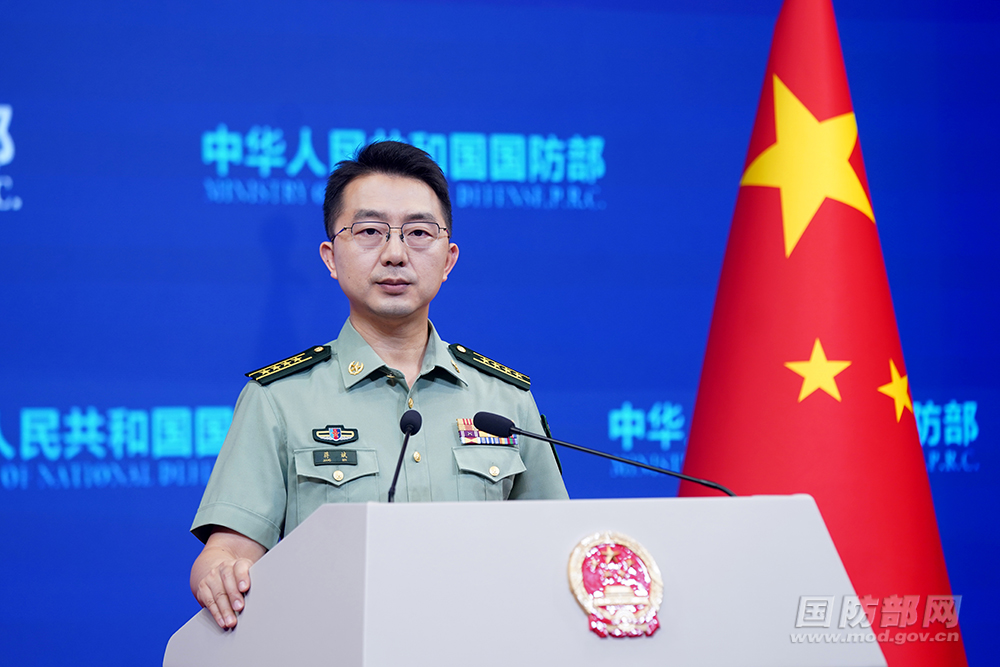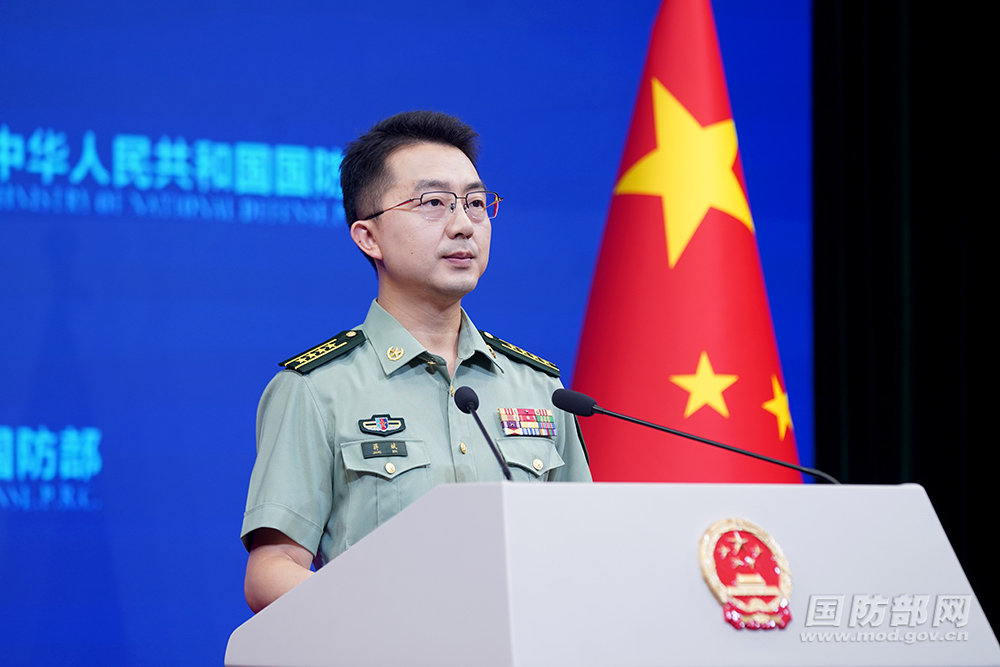On the afternoon of July 14, 2025, Senior Colonel Jiang Bin, Deputy Director-General of the Information Office of China's Ministry of National Defense (MND) and Spokesperson for the MND, answered recent media queries concerning the military.

On the afternoon of July 14, 2025, Senior Colonel Jiang Bin, Deputy Director-General of the Information Office of China's Ministry of National Defense (MND) and Spokesperson for the MND, answers recent media queries concerning the military. (Photo by Sun Yue)
Jiang Bin: First, I would like to announce two pieces of information.
First, the Young Leaders Conference of China-Africa Peace and Security Forum will be held in Nanjing from July 15 to 19, with about 90 mid-and-senior level military officers from over 40 African countries attending. The Conference is hosted by the Chinese Ministry of National Defense and organized by the PLA Army Command College. With the theme of Building Peace Together for the Future, the conference is aimed at implementing the outcomes of the Beijing Summit of the Forum on China-Africa Cooperation, and further boosting consensus, solidarity and cooperation between China and African countries on peace and security, so as to facilitate the building of an all-weather China-Africa community with a shared future for the new era.
Second, army special forces of China and Serbia will carry out Peace Guardian-2025 joint training in Hebei in the second half of July. This will be the first joint training between Chinese and Serbian militaries. It will help strengthen combat capabilities of participating troops and deepen cooperation between the two militaries.
Journalist: The Philippine Defense Secretary has recently said in an interview that China's willingness to sign the Protocol to the Treaty on the Southeast Asia Nuclear Weapon-Free Zone was just a symbolic gesture. With one of the world's largest nuclear arsenals, China should denuclearize first to show its sincerity. Do you have any comment?
Jiang Bin: Some people in the Philippines often make groundless accusations against China's efforts in preserving regional peace. Do they speak for themselves or stand for their country? We are not sure. Establishing the Southeast Asia nuclear weapon-free zone (SEANWFZ) is significant for strengthening the international nuclear non-proliferation regime and promoting regional peace and stability, and is conducive to the fundamental security interests of ASEAN countries. The Chinese side is firmly committed to such an undertaking, and has made clear our willingness to take the lead in signing the Protocol.
China follows a policy of no-first-use of nuclear weapons, and has made an unconditional commitment of not using or threatening to use nuclear weapons against non-nuclear-weapon states or nuclear weapon-free zones. China is the only nuclear-weapon state that has made such a commitment. China's nuclear force and nuclear policy have been a significant contribution to world peace, which is widely recognized by the international community.
Journalist: Sources from the Japanese government said that Japan plans to export six Abukuma-class frigates to the Philippines. Some analysts believe this is aimed at "China's maritime expansion". What's your take?
Jiang Bin: It is our consistent position that defense and security cooperation between relevant countries should not target at any third party or harm the interests of any third party. During WWII, Japanese militarists committed heinous crimes when they invaded and colonized Japan's neighboring countries, including China and the Philippines, and occupied islands in the South China Sea. In recent years, Japan has breached its commitments under the pacifist Constitution and exclusively defense-oriented policy by continuously exporting weapons and equipment to other countries, attempting to build small cliques to stir up trouble in the South China Sea, which created destabilizing factors in the Asia-Pacific region. This year marks the 80th anniversary of the victory of the Chinese People's War of Resistance Against Japanese Aggression and the World Anti-Fascist War. We urge the Japanese side to deeply reflect on and draw lessons from history, speak and act prudently on military and security matters, and do more to contribute to regional peace and stability.
Journalist: The head of Taiwan's military agency has reportedly announced the establishment of Taiwan's first HIMARS company, and that it will greatly improve the Taiwan military's precision strike and overall defense capabilities. In addition, Taiwan's military agency has approved the acquisition of 168 units of US M109A7 self-propelled howitzers. Do you have any comment?
Jiang Bin: In order to solicit US support for "Taiwan independence", the DPP authorities are selling Taiwan's interests to flatter the US and squandering the hard-earned money of the Taiwan people to pay protection fees. Buying US weapons to embolden themselves is useless and self-deceiving. Resisting reunification by force is a dead end. War provocations made by the "Taiwan independence" armed forces are futile, and will only lead to self-destruction.

On the afternoon of July 14, 2025, Senior Colonel Jiang Bin, Deputy Director-General of the Information Office of China's Ministry of National Defense (MND) and Spokesperson for the MND, answers recent media queries concerning the military. (Photo by Sun Yue)
Journalist: According to reports, the DPP authorities stated that the activation of the W121 extension of the M503 route by the Civil Aviation Administration of China intends to reduce the depth of Taiwan's air defense and shorten its early warning time, which would ultimately eliminate the "median line of the Taiwan Strait", thereby posing military threats to Taiwan. Some media reports said that the activation came just days before Taiwan's Han Kuang military exercise, and might escalate tensions across the Taiwan Strait. What's your comment?
Jiang Bin: Taiwan is a part of China and there is no so-called "median line of the Taiwan Strait". The establishment and activation of relevant route is a routine work carried out by the competent authorities based on the needs of civil aviation development and management. It is beneficial to compatriots on both sides of the Strait. The DPP authorities used it as an excuse to hype up the so-called "military threats from the mainland" for their selfish gains, attempting to create security anxiety, intensify antagonism and confrontation, and obstruct cross-Strait exchanges. Their scheme would never be welcomed nor succeed.
The root cause for the current tension across the Taiwan Strait lies in the DPP authorities' collusion with external forces in their continuous provocations for "Taiwan independence". We hope that all Taiwan compatriots can see through the true nature of the DPP authorities in seeking independence, realize the serious harm of "Taiwan independence", firmly oppose "Taiwan independence" separatist activities, and jointly safeguard cross-Strait peace and stability.













